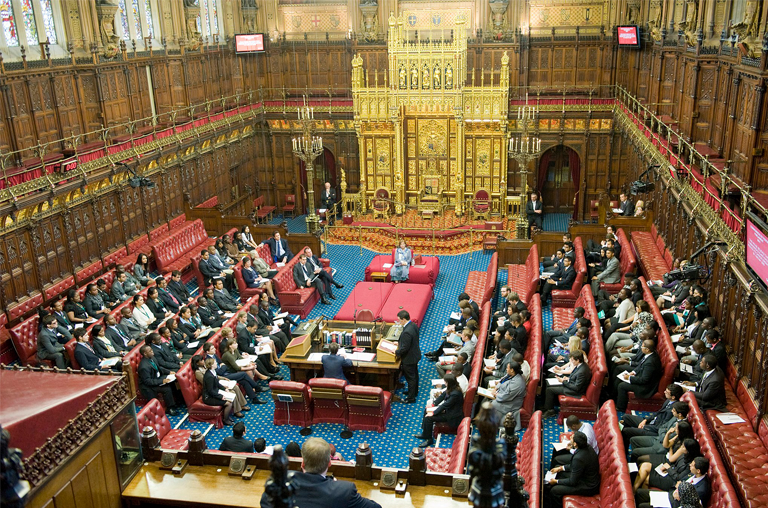Exclusive polling that we have undertaken in collaboration with Byline Times reveals that the public are generally disapproving of political donors receiving rewards and access after parting with their cash – with Conservative voters more concerned than Labour.
The majority of voters believe that people who donate to political parties should not receive rewards, exclusive polling for Byline Times can reveal.
Overall, 72% of those surveyed said that donors should not receive honours and peerages. Matching this trend, 72% of those surveyed who voted Conservative in 2019 did not think that donors should receive these rewards, compared to 66% of 2019 Labour voters.
Just more than half of the voters believe that people who donate to political parties should not expect their interests to be promoted by MPs.
53% of people surveyed said that donations should not translate into MPs furthering their backers’ interests, with Conservative voters (56%) more likely to protest a quid pro quo system. This compares to the 47% of people surveyed who voted Labour in 2019 believing that donors’ political interests should not be advanced.
The poll of a random sample of 993 adults into attitudes on political donations was commissioned by Byline Times and carried out by independent polling company Omnisis. The findings follow an exclusive investigation into the profiles of elite Conservative Party donors by the Byline Intelligence Team and The Citizens.
The investigation identified 286 individuals who had given a single donation to the Conservative Party worth more than £100,000 in the past 10 years. Of the 286, the average elite donor was a white, middle-aged, male banker living in London who had donated more than £530,000.
No Rewards for Donations
Older voters were more likely to believe that political donors should not be allowed to receive rewards such as honours and peerages, with 98% of those surveyed aged 65 and over saying that such awards should not be given to donors. This dropped to 47% of 25 to 34 year olds. Only 53% of the youngest voters surveyed (18 to 24) thought that donors should not receive rewards.
This means that the cohort that are most likely to have received awards following sizable donations – older, wealthy Conservative donors – are also the most likely to be frowned upon by Conservative voters of a similar age for having obtained an honour in these circumstances.
The Byline Intelligence Team and The Citizens’ investigation also found that 26% of elite Conservative Party donors have been awarded a peerage or honour such as an MBE. It revealed that the more people gave, the more likely they were to be honoured.
Eleven out of 20 individuals who have donated £1.5 million to the Conservative Party in the past decade received some sort of honour. Ten of those had received an award since the Conservatives formed a Coalition Government in 2010.
There is no evidence to suggest that the honours or peerages were given in exchange for donations, but it raises significant questions as to the impartiality of the honours system.
Conservative voters were also less likely to agree that donations should translate into access to politicians. Only 33% of those surveyed who voted Conservative in 2019 said that political donors should have access to politicians, while 67% said no.
Access appeared to be more likely to be accepted by Labour voters at the last general election – 41% said that donors should expect political access, while 59% said that they should not. This may reflect how Labour Party funding is often linked to trade unions, which represent mass public movements rather than individual interests.
The poll’s findings should provoke concern within the Conservative Party, which has increasingly been embroiled in rows over lobbying and political access. These include former Prime Minister David Cameron using his parliamentary connections to lobby for the collapsed Greensill Capital firm, and accusations that the Housing, Communities and Local Government Secretary Robert Jenrick helped party donor Richard Desmond avoid a £45 million tax bill after the pair were seated together at a dinner.
The Conservative Party has also faced criticism for its “advisory board” – an organisation designed to connect generous donors with high-ranking politicians. Wealthy supporters could also join the Leader’s Group, an elite dining society where donors can mingle with political figures including the Prime Minister.
The poll’s findings suggest a real danger for the Conservative Party at the next general election. With the cracks starting to show in its ‘Blue Wall’ constituencies in a by-election loss earlier this year, the gap between shire Conservative voters and the Government’s big money backers appears to be growing wider.
The majority of respondents across all age and voting demographics believed that there should be a cap on political donations, including 79% of those surveyed who voted Conservative in 2019, and 84% of 2019 Labour voters.
Read the full results here.
The online poll was conducted for Byline Times by Ominisis between 4 and 8 September 2021.
Main image credit:https://civilservicelocal.blog.gov.uk/2015/02/26/learning-about-the-workings-of-parliament/

